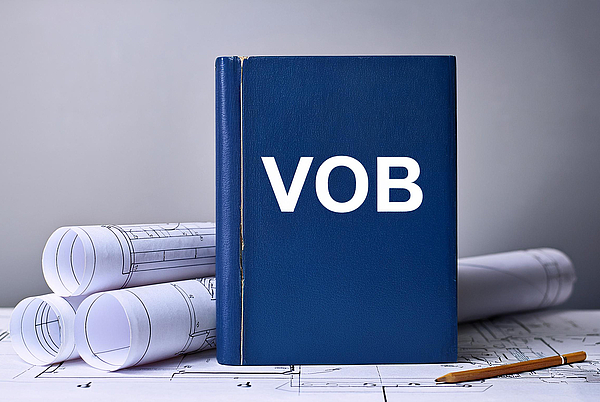The German Construction Tendering and Contract Regulations (VOB) are a central set of rules in the German construction industry. It regulates the awarding of construction contracts and the processing of construction contracts and ensures that construction projects are carried out in a fair and transparent manner. This blog post sheds light on the importance of the VOB, its structure and the key provisions that building owners, clients and contractors should be aware of.
What is the VOB? - An overview
The VOB is a comprehensive set of rules that has served as the basis for construction contracts in Germany for many decades. It consists of three parts:
VOB/A: Regulations for the award of construction contracts. It describes the procedures according to which public contracts for construction services must be awarded.
VOB/B: General conditions of contract for the execution of construction work. This section contains the most important contractual conditions that apply to construction contracts between the client and contractor.
VOB/C: Technical contract conditions for construction work. This section contains detailed technical regulations and service descriptions that are binding for the various construction trades.
VOB/A: Transparency in the awarding of construction contracts
The first part of the VOB, the VOB/A, is particularly important for the public sector and companies that award public contracts. It specifies how construction contracts must be tendered and awarded in order to ensure fair competitive conditions. A distinction is made between different award procedures, including open, restricted and negotiated procedures. The aim is to prevent corruption and ensure equal opportunities for all bidders.
VOB/B: The basis for construction contracts
The second part of the VOB, the VOB/B, is of central importance for the practical drafting of contracts. It defines the rights and obligations of the contracting parties and regulates important aspects such as
Construction time: regulations on setting deadlines and the consequences of delays.
Invoicing: Provisions for invoicing the services rendered, including the methods for determining the remuneration.
Liability for defects: Provisions on liability for construction defects and the client's claims.
Right of cancellation: Conditions under which a construction contract can be cancelled.
In practice, the VOB/B is often used as a contractual basis, as it creates a balanced relationship between the interests of clients and contractors.
VOB/C: Technical details and standards
The third part of the VOB, the VOB/C, contains the technical contractual conditions for various construction trades. Here you will find detailed specifications on the execution standards, which ensure that construction work is carried out professionally and in accordance with the state of the art.
Technical standards: VOB Part C specifies in detail how various construction services are to be carried out technically. This ensures a high and standardised quality of work, regardless of which trade is involved (e.g. earthworks, concrete work, MEPC).
Measurement and invoicing principles: It describes exactly how measurements are to be taken for invoicing the services provided. This is crucial for transparent and correct invoicing between the contractor and client.
Regulation of ancillary and special services: VOB Part C defines which ancillary services the contractor must provide without separate remuneration and which services are considered special services and can be invoiced separately.
To summarise, VOB/C ensures clarity and commitment in the execution of construction work, which leads to uniform quality, fair invoicing and clear contractual relationships.
Why the VOB is important for all parties involved
The VOB provides a legal framework that regulates the cooperation between clients, contractors and building contractors and creates the basis for a fair and transparent construction process. For clients, it is an indispensable instrument for ensuring that construction contracts are awarded in a legally compliant manner and in accordance with the applicable regulations. For contractors, the VOB provides clear guidelines that help to avoid conflicts and ensure the quality of construction work.
Conclusion: The VOB as an indispensable set of rules in the construction industry
The VOB is a complex and indispensable set of rules that is deeply rooted in German construction practice. It provides the basis for the smooth and fair processing of construction contracts and offers clear guidelines for all phases of a construction project - from tendering to acceptance. Without the VOB, the construction industry in Germany would be far more prone to misunderstandings and legal disputes. Knowledge of the VOB is therefore essential for all those involved in the construction process in order to realise construction projects successfully and with legal certainty.
In this context, we can only provide a superficial overview of the VOB here. If you would like to delve deeper into the subject matter and learn more about the individual aspects, we recommend our more detailed blog posts on Parts A, B and C of the VOB, which will follow shortly. These will provide detailed information and address the topics at a more in-depth level.











